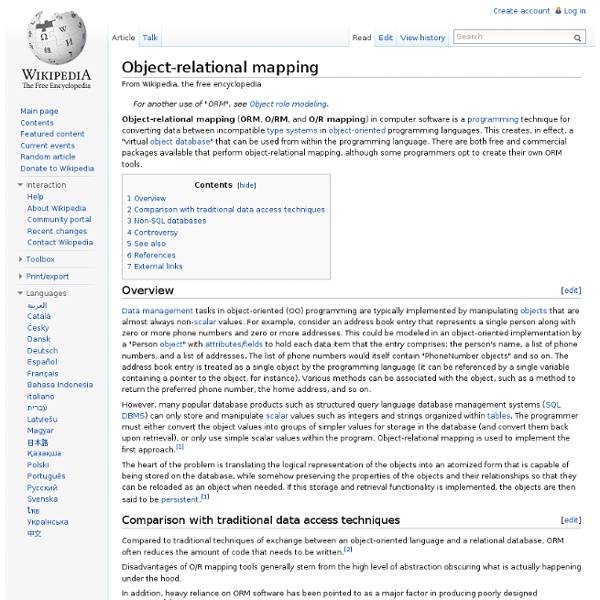Object-relational mapping

Object-relational impedance mismatch
The object-relational impedance mismatch is a set of conceptual and technical difficulties that are often encountered when a relational database management system (RDBMS) is being used by a program written in an object-oriented programming language or style; particularly when objects or class definitions are mapped in a straightforward way to database tables or relational schema. The term object-relational impedance mismatch is derived from the electrical engineering term impedance matching. Mismatches[edit] Object-oriented concepts[edit] Encapsulation[edit] Accessibility[edit] In relational thinking, "private" versus "public" access is relative to need rather than being an absolute characteristic of the data's state, as in the OO model. Interface, class, inheritance and polymorphism[edit] Mapping to relational concepts[edit] Data type differences[edit] Structural and integrity differences[edit] Manipulative differences[edit] Transactional differences[edit] Solving impedance mismatch[edit]
sql - How can you represent inheritance in a database
Mapping objects to relational databases
Why a paper about mapping objects to relational databases? Because of the "impedance mismatch" between the object paradigm and the relational paradigm. The object paradigm is based on software engineering principles such as coupling, cohesion, and encapsulation, whereas the relational paradigm is based on mathematical principles, particularly those of set theory. The two different theoretical foundations lead to different strengths and weaknesses. This paper should alleviate several common misconceptions prevalent in development circles today, presenting a practical look at the issues involved with mapping objects to relational databases. How to map objects to relational databases In this section I will describe the fundamental techniques required to successfully map objects into relational databases: Back to top Mapping attributes to columns A class attribute will map to either zero or a number of columns in a relational database. Implementing inheritance in a relational database Table 1.
Mapping Objects to Relational Databases: O/R Mapping In Detail
Most modern business application development projects use object technology such as Java or C# to build the application software and relational databases to store the data. This isn’t to say that you don’t have other options, there are many applications built with procedural languages such as COBOL and many systems will use object databases or XML databases to store data. However, because object and relational technologies are by far the norm that’s what I assume you’re working with in this article. If you’re working with different storage technologies then many of the concepts are still applicable, albeit with modification (don’t worry, Realistic XML overviews mapping issues pertaining to objects and XML). Table of Contents 1. When learning how to map objects to relational databases the place to start is with the data attributes of a class. It can make it easier to think that classes map to tables, and in a way they do, but not always directly. For now, let’s keep things simple. 2.
Database Design - Introduction
Please note: This site is no longer maintained. The latest version is now edited by Prof. Alvaro Monge, located on the CSULB Web site. This third edition of dbDesign is a general update, both to meet legal requirements for U.S. “Section 508” accessibility and to bring the code into compliance with the latest World Wide Web Consortium standards. The second edition was largely motivated by the very helpful comments of Prof. The original site was the outgrowth of a previous book project, Practical Relational Database Design, by Wayne Dick and Tom Jewett. In every edition of this site, I owe a huge debt of gratitude to Prof. Copyright © 2002–2006, by Tom Jewett.
What is Object/Relational Mapping? - JBoss Community
'Object-Relational Impedance Mismatch' (sometimes called the 'paradigm mismatch') is just a fancy way of saying that object models and relational models do not work very well together. RDBMSs represent data in a tabular format (a spreadsheet is a good visualization for those not familiar with RDBMSs), whereas object-oriented languages, such as Java, represent it as an interconnected graph of objects. Loading and storing graphs of objects using a tabular relational database exposes us to 5 mismatch problems… Granularity Sometimes you will have an object model which has more classes than the number of corresponding tables in the database (we says the object model is more granular than the relational model). Subtypes (inheritance) Inheritance is a natural paradigm in object-oriented programming languages. Identity A RDBMS defines exactly one notion of 'sameness': the primary key. Associations This is not an efficient way of retrieving data from a relational database.
Welcome to the Doctrine Project — Doctrine-Project
Related:
Related:



